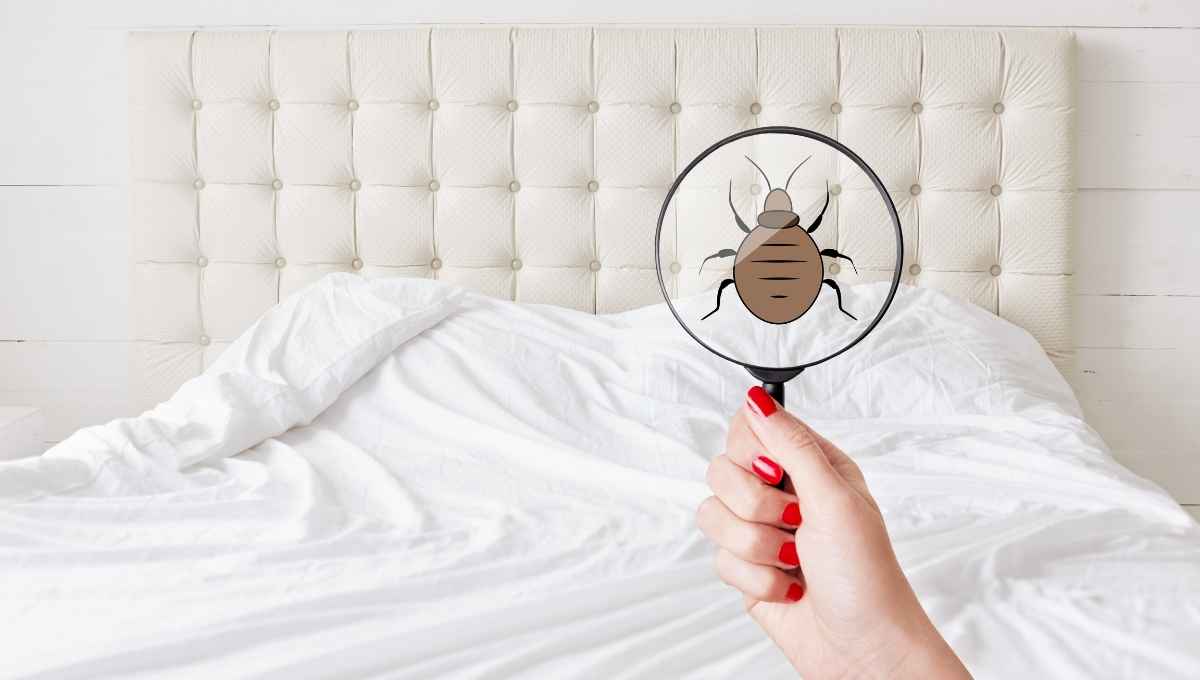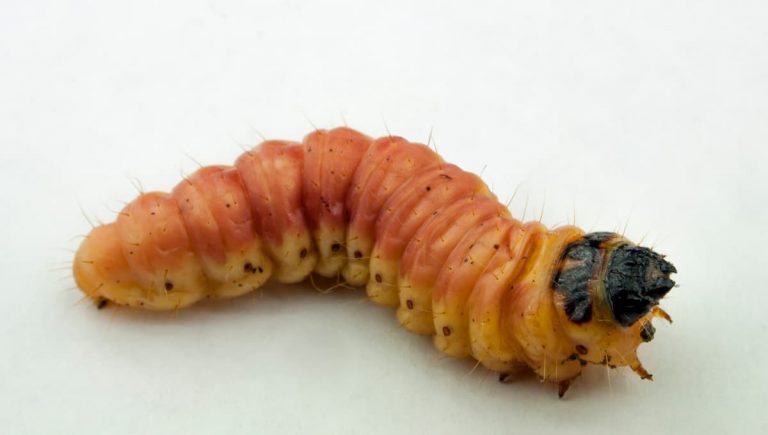Neighbor Has Bed Bugs? (You Should Do This ASAP!)

Finding out your neighbor has bed bugs can cause you to itch all over, especially if you live in an apartment. But are you destined for a bed bug infestation, or is there something you can do about it?
If your neighbor has bed bugs, you should check your home for bed bugs as soon as possible. Bed bugs can travel through walls and yards, so there is a chance they have already or are starting to make their way to your home.
Before you freak out, let us discuss how concerned you need to be about this. We will then deep-dive into how you can get rid of bed bugs and later, how you can prevent them from returning.
This post contains affiliate links from Amazon and other stores. This means Yard Blogger may earn a commission if you make a purchase using any of our links. Please refer to our full affiliate disclosure policy for full details.
Here’s a Quick Pro Tip!
Thankfully, bed bugs do not pose a great risk to our health but that does not mean we want them around! If your neighbor has bed bugs, there’s a good chance they may make their way to you.
Choose from any of these prevention products to keep them from breaking in:
1. Ecoraider Bed Bug Killer – A safe and effective spray to use around your home
2. Mattress Encasement – Perfect for trapping and suffocating bed bugs that are already on your bed
3. Bed Bug Traps – The go-to trap to place under your bed that bed bugs can’t crawl out of
To Be Concerned or Not to Be Concerned
Just because your neighbor has bed bugs does not mean that you do. Let’s discuss whether or not you should be concerned if your neighbor has bed bugs.
What Do I Do if My Neighbor Has Bed Bugs?
The first thing you should do if your neighbor has bed bugs is to inspect your home for bed bugs, as well. Bed bugs can move between walls and through yards until they find a new host.
Although it is not guaranteed that you will have bed bugs if your neighbor has them, there is still a chance. Therefore, you should thoroughly inspect your mattresses, chairs, and couches.
Also, look at cracks in your bed frame and the headboard.
Can You Get Bed Bugs From Your Neighbor?
You will likely get bed bugs from your neighbor if you live in a townhouse, condo, or apartment. This is because bed bugs can travel easily through vents and between electrical outlets and walls.
It is still possible to get bed bugs if you live in a detached home. They can travel by foot and cross your yard, entering through your windows and below doors.
They also can live on your neighbor’s clothes. But, unlike fleas, they do not hop, only crawl. So, avoid coming close to your neighbor if they have a bed bug infestation.
Should I Be Concerned if My Neighbor Has Bed Bugs?
You should be cautious if your neighbor has bed bugs, especially if you live in an apartment and share a wall. Bed bugs can travel through vents, across pipes, and between walls.
If you live in a detached home from your neighbor, you should still be on guard for bed bugs. Bedbugs are capable of traveling outside through your yards into your home.
They can also attach to pets or kids who interact with your neighbors.
Can Your Neighbor Give You Bed Bugs?
Your neighbor can give you bed bugs. Unfortunately, the bed bugs can travel through your neighbor’s walls into your home or yard if you live in a detached house.
Bed bugs can also attach to your neighbor or their belongings. If you interact with your neighbor often, the bed bugs can transfer from you to your neighbor.
This transfer can also occur by pet-to-pet or child-to-child.
You might also enjoy our post on How to Keep Spiders Away While Sleeping
Should I Tell My Property Manager That My Neighbor Has Bed Bugs?
If you live in an apartment building, you should definitely tell your property manager that your neighbor has bed bugs. The bed bugs will likely spread to the rest of the apartments and cause an infestation outbreak.
When you tell your property manager that your neighbor has bed bugs, they will likely hire a pest control company to inspect the unit.
If the pest control company suspects that the other units are affected, they will have to treat all apartments.
This is an ideal way to get your apartment professionally inspected and possibly treated. It is the best preventative measure that you can take.
Checking for Bed Bugs
Now that we have gauged the possibility of encountering some bed bugs, let’s find out how you can check for those nasty critters.
How to Check for Bed Bugs
You should start looking for bed bugs in the seams and tags of your mattress and box spring and the bed frame and headboard cracks. Crushed bed bugs will appear as small, rust-colored spots.
You can also keep an eye out for eggs and eggshells about 1mm in width. Finally, if you do not find anything on your bed, look for small dark spots around window frames or electrical outlets.
Can You See Bed Bugs With the Human Eye?
It is possible to see bed bugs with the human eye. Live bed bugs appear as small moving dark spots on your bed, couch, around electrical outlets, or on window frames. When not moving, bed bugs tend to gather together in the same spot.
Dead bed bugs will appear as rust-colored stains that look like a marker bleed on the fabric. You may also be able to see the eggs and eggshells of bed bugs about 1mm in size.
When the bed bugs grow larger, they shed a pale yellow skin that you can also see in place of infestations.
Signs That Your Have Bed Bugs
The first sign people usually see when they have bed bugs is waking up with red itchy spots on their skin. These bites are usually in lines either on their legs on the back. However, these bites can often be confused for bites from other insects.
Therefore, it is essential to know what other signs to look out for, including these:
- An unexplained, musty odor
- Small bloodstains on your sheets
- Dark, rust-colored spots on your mattress
- Dark spots on your wall, specifically around electrical outlets
- A collection of white bed bug shells
- Tiny, white spots in the cracks of your furniture
What Bugs Can Be Mistaken for Bed Bugs?
Many bugs can be mistaken for bed bugs, such as spider beetles. These bugs are a similar color and size compared to bed bugs, making them a common misconception.
Other bugs that are mistaken for bed bugs include:
- Bat bugs
- Booklice
- Carpet beetles
- Fleas
- Cockroach nymphs
- Ticks
- Swallow bugs
- Head lice
You might also enjoy our post on How to Get Rid of Roaches Coming From Your Neighbors Property
How Do You Get Bed Bugs Out of Hiding?
If you’re looking for bed bugs in the middle of the day, you may have more difficulty. This is because bed bugs tend to move the most at night, especially when their source is nearby.
The best way to find bed bugs is to wait until the middle of the night. To do this, set an alarm for around 2-4 am.
Then, as soon as you wake up, turn on all of your lights and start searching for the bed bugs all over your mattress, specifically around the edges of your mattress.
My Neighbor Gave Me Bed Bugs
Unfortunately, after your deep inspection, you found out that your neighbor has, indeed, given you bed bugs. What now?
Can You Get Bed Bugs If Your Neighbor Has Them?
It is very possible that your neighbor can give you bed bugs. If you find out that your neighbor has bed bugs, you should avoid interacting with that neighbor until their situation has been resolved.
Since bed bugs can travel on people’s clothing, not interacting with your neighbor will prevent the bed bug from getting into your home through that method.
However, you should still put in place all other preventative measures to keep the bed bugs out.
Can I Sue My Neighbor for Giving Me Bed Bugs?
You might be able to sue your neighbor for giving you bed bugs if the bed bugs caused you physical harm and the neighbor did not do anything to take care of their bed bug infestation.
Whether or not you will be able to sue your neighbor for giving you bed bugs will depend on your specific situation. You would have a better chance of suing them if they neglected their bed bug infestation.
Additionally, if the bed bugs caused you any physical harm, other than common bites, you may have a better chance of suing them.
How Do I Get Rid of Bed Bugs?
If you have a bed bug infestation, the best thing to do is to call a pest control company to perform a bed bug spray that will kill all of the bed bugs.
Although this is a pricier option, it will be the most effective for you. But, there are some options that you can do yourself, instead.
Follow these tips to get rid of bed bugs fast:
- Clean all of your bedding, curtains, and clothing in hot water. Follow by drawing them on the highest dryer setting.
- Use a stiff brush to scrub the edges of your mattress to remove the bugs and their eggs.
- Vacuum your bed and the bottom of your frame. Once you’re done vacuuming, place the vacuum bag in a plastic garbage bag and bring outdoors.
- Put a zippered cover on top of your mattress and box springs to prevent any leftover bedbugs from escaping. The bedbugs will eventually die.
- Get rid of any clutter around your bed.
A Bed Bugs Mode of Transportation
You are likely wondering how those bed bugs even got into your home in the first place? Did the bed bugs fly? Take an Uber? Let’s discuss!
How Do Bed Bugs Travel?
Bed bugs do not have wings, so they travel on foot. Since they are so small, it takes them a while to crawl from one place to another. This can drag out the infestation process, giving you lots of time to stop it before it begins.
If you live in an apartment, bed bugs will be able to travel through vents, walls, and electrical outlets. Unfortunately, they can also travel outside from one house to another.
They can also travel via humans or pets if they attach to them.
How Far Will Bed Bugs Travel in a Home?
Once a bed bug has found a suitable host, it will typically travel 40 to 50 feet away from that host and back. However, they don’t have much reason to leave once they find a host.
The only reason bed bugs would leave a host is to find a suitable place to give birth to more bed bugs. This is typically why one group of bed bugs will migrate to a new place.
For example, if your neighbor’s bed bugs now need a new home, they can travel through your shared walls and set up in your home.
You might also enjoy our post on 10 House Plants That Keep Spiders Away For Good
Can Bed Bugs Travel Across Your Yard?
Bed bugs can travel through your yard but typically won’t last as long outdoors as they do inside. But, the chances of them still making it to your house is likely.
If bed bugs are desperate for a new host, they will travel outside, through your yard, to your home.
They have adapted to outdoor conditions, but they will die if they don’t get to a host fast enough since they only feed on human blood.
Do Bed Bugs Come In From Outside?
Bed bugs will come from outside when brought in through infested mattresses, furniture, luggage, or even a person’s clothing. They also travel through walls, if you live in an apartment, or through yards, if you live in a detached home.
Bed bugs can be brought inside from used clothing or furniture if that furniture is already infested with bug beds. They can also come in from clothing if someone visits your house with a bed bug infestation.
How Long Can Bed Bugs Live Outside?
Bed bugs can survive outside for multiple months as long as the weather conditions are ideal. However, bed bugs will not be able to survive temperatures lower than 0 degrees Fahrenheit and higher than 120 degrees Fahrenheit.
They also do not do well in precipitation, such as rain and snow. Additionally, they can be eaten by lizards, spiders, and cockroaches.
Therefore, bed bugs may not last up to a week outside considering common weather changes.
When Would Bed Bugs Be Found Outdoors?
Although it is rare, bedbugs can be found in outdoor furniture, under piles of wood or rubbish, and in cracks in outdoor structures.
You may also be able to find bed bugs living on your fence, especially if it is wooden. This is why it is always good to keep your yard clean of clutter and well-groomed.
Can Bed Bugs Travel Through Walls?
Bed bugs are very well known to travel through walls. Given their small size, and the fact that they don’t have wings, their main mode of travel is through small cracks in walls.
Other than cracks in the walls, bed bugs can travel through vents that connect walls and electrical outlets. If you suspect that you have bed bugs, checking these areas is always good.
You will be able to see the bed bugs as small dots surrounding the electrical outlets and the vents.
Can Bed Bugs Travel to Another House?
Bedbugs are capable of traveling to another house. Since it is difficult for them to travel outdoors, given the poor weather conditions, they may hitch a ride on a person or a pet.
If you know that your neighbor has bed bugs, you should avoid interacting with them until their situation has been resolved.
You should also keep your pets inside your home, so they cannot interact with their pets or come close to their yard.
Preventative Measures for Bed Bugs
Now that we have determined all the ways bed bugs travel and how to get rid of them, let’s discuss ways that we can prevent them from EVER entering again.
How Do You Prevent Bed Bugs From Entering Your Home?
If you have a bed bug infestation close to your home, you can use essential oils around your home to prevent them from getting in. Tea tree oil specifically kills bed bugs as soon as they come near it.
You should place tea tree oil around all of your windows, your doorways, and any vents that lead outside. Also, place tea tree oil around your mattress and on your headboard.
If you want to take a more intense approach, you can use Raid around your entryways and windows.
If you live in an apartment, you should place the raid around your vents, your electrical outlets, under your door cracks, and any small cracks that you may see in your walls.
You might also enjoy our post on If You Can Sue Your Neighbors for Roaches and Actually Win
What Keeps Bed Bugs Away?
When there is a known infestation in your area, your best bet to keep bed bugs away is to use Raid. Raid is a poison to bed bugs and will kill them upon contact.
You should spray raid anywhere where you think the bed bugs may be able to enter your home. For example, under doorways, through windows, or through any electrical outlets or vents that come from the outside.
However, Raid can be dangerous to inhale for long periods of time, and dangerous for pets to lick off the ground. Therefore, you can use tea tree oil in place of the raid.
But, with tea tree oil you will have to apply it more often.
What Do Bed Bugs Hate the Most?
Bed bugs hate certain scents such as tea tree oil, lavender, mint, cinnamon, basil, and citrus. This makes common deterrents very useful on bedbugs while providing a nice scent to your home.
Using an all-natural deterrent spray all over your mattress and sheets effectively kills and prevents any bedbugs from disturbing you.
These all-natural sprays will not harm your lungs in any way or harm pets who may lick your sheets. And, they smell beautiful!
Do Bed Bugs Have a Natural Enemy?
Many insects feed on bed bugs including ants, cockroaches, spiders, and many more. Although this may be a natural way to get rid of bed bugs, it is not good to introduce more insects into your home.
Unless you have a pet spider, you should not consider using other bugs or insects to get rid of your bed bugs.
You could find yourself with yet another infestation if your new bugs find your home to be ideal and caught in a vicious cycle.
Related Questions
How Fast Do Bed Bugs Grow?
It typically takes a bed bug seven weeks to grow from an egg to a fully functioning adult. So, if you have an infestation of several adult bed bugs, they have likely been there for at least two months.
Bed bugs generally give birth to around 500 eggs, causing bed bug infestations to appear out of nowhere suddenly.
Once the mother bed bug finds a suitable host to feed off, she will typically give birth in the same area.
Final Thoughts
For most people, just the thought of a bed bug can cause you to itch. They are the last thing anyone wants to get to bed with every night.
If you know your neighbor has bed bugs, you should implement all the preventative strategies we discussed to prevent those little critters from latching on to you each night.










